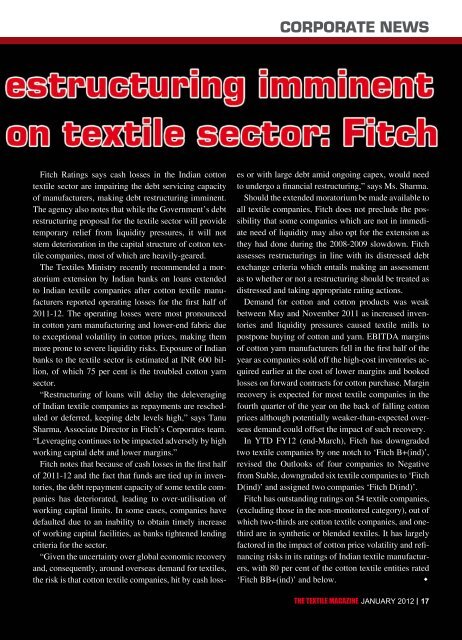policy initiatives - Textile Magazine
policy initiatives - Textile Magazine
policy initiatives - Textile Magazine
Create successful ePaper yourself
Turn your PDF publications into a flip-book with our unique Google optimized e-Paper software.
corporate news<br />
Fitch Ratings says cash losses in the Indian cotton<br />
textile sector are impairing the debt servicing capacity<br />
of manufacturers, making debt restructuring imminent.<br />
The agency also notes that while the Government’s debt<br />
restructuring proposal for the textile sector will provide<br />
temporary relief from liquidity pressures, it will not<br />
stem deterioration in the capital structure of cotton textile<br />
companies, most of which are heavily-geared.<br />
The <strong>Textile</strong>s Ministry recently recommended a moratorium<br />
extension by Indian banks on loans extended<br />
to Indian textile companies after cotton textile manufacturers<br />
reported operating losses for the first half of<br />
2011-12. The operating losses were most pronounced<br />
in cotton yarn manufacturing and lower-end fabric due<br />
to exceptional volatility in cotton prices, making them<br />
more prone to severe liquidity risks. Exposure of Indian<br />
banks to the textile sector is estimated at INR 600 billion,<br />
of which 75 per cent is the troubled cotton yarn<br />
sector.<br />
“Restructuring of loans will delay the deleveraging<br />
of Indian textile companies as repayments are rescheduled<br />
or deferred, keeping debt levels high,” says Tanu<br />
Sharma, Associate Director in Fitch’s Corporates team.<br />
“Leveraging continues to be impacted adversely by high<br />
working capital debt and lower margins.”<br />
Fitch notes that because of cash losses in the first half<br />
of 2011-12 and the fact that funds are tied up in inventories,<br />
the debt repayment capacity of some textile companies<br />
has deteriorated, leading to over-utilisation of<br />
working capital limits. In some cases, companies have<br />
defaulted due to an inability to obtain timely increase<br />
of working capital facilities, as banks tightened lending<br />
criteria for the sector.<br />
“Given the uncertainty over global economic recovery<br />
and, consequently, around overseas demand for textiles,<br />
the risk is that cotton textile companies, hit by cash losses<br />
or with large debt amid ongoing capex, would need<br />
to undergo a financial restructuring,” says Ms. Sharma.<br />
Should the extended moratorium be made available to<br />
all textile companies, Fitch does not preclude the possibility<br />
that some companies which are not in immediate<br />
need of liquidity may also opt for the extension as<br />
they had done during the 2008-2009 slowdown. Fitch<br />
assesses restructurings in line with its distressed debt<br />
exchange criteria which entails making an assessment<br />
as to whether or not a restructuring should be treated as<br />
distressed and taking appropriate rating actions.<br />
Demand for cotton and cotton products was weak<br />
between May and November 2011 as increased inventories<br />
and liquidity pressures caused textile mills to<br />
postpone buying of cotton and yarn. EBITDA margins<br />
of cotton yarn manufacturers fell in the first half of the<br />
year as companies sold off the high-cost inventories acquired<br />
earlier at the cost of lower margins and booked<br />
losses on forward contracts for cotton purchase. Margin<br />
recovery is expected for most textile companies in the<br />
fourth quarter of the year on the back of falling cotton<br />
prices although potentially weaker-than-expected overseas<br />
demand could offset the impact of such recovery.<br />
In YTD FY12 (end-March), Fitch has downgraded<br />
two textile companies by one notch to ‘Fitch B+(ind)’,<br />
revised the Outlooks of four companies to Negative<br />
from Stable, downgraded six textile companies to ‘Fitch<br />
D(ind)’ and assigned two companies ‘Fitch D(ind)’.<br />
Fitch has outstanding ratings on 54 textile companies,<br />
(excluding those in the non-monitored category), out of<br />
which two-thirds are cotton textile companies, and onethird<br />
are in synthetic or blended textiles. It has largely<br />
factored in the impact of cotton price volatility and refinancing<br />
risks in its ratings of Indian textile manufacturers,<br />
with 80 per cent of the cotton textile entities rated<br />
‘Fitch BB+(ind)’ and below.<br />
•<br />
The <strong>Textile</strong> <strong>Magazine</strong> jANUARY 2012 | 17






